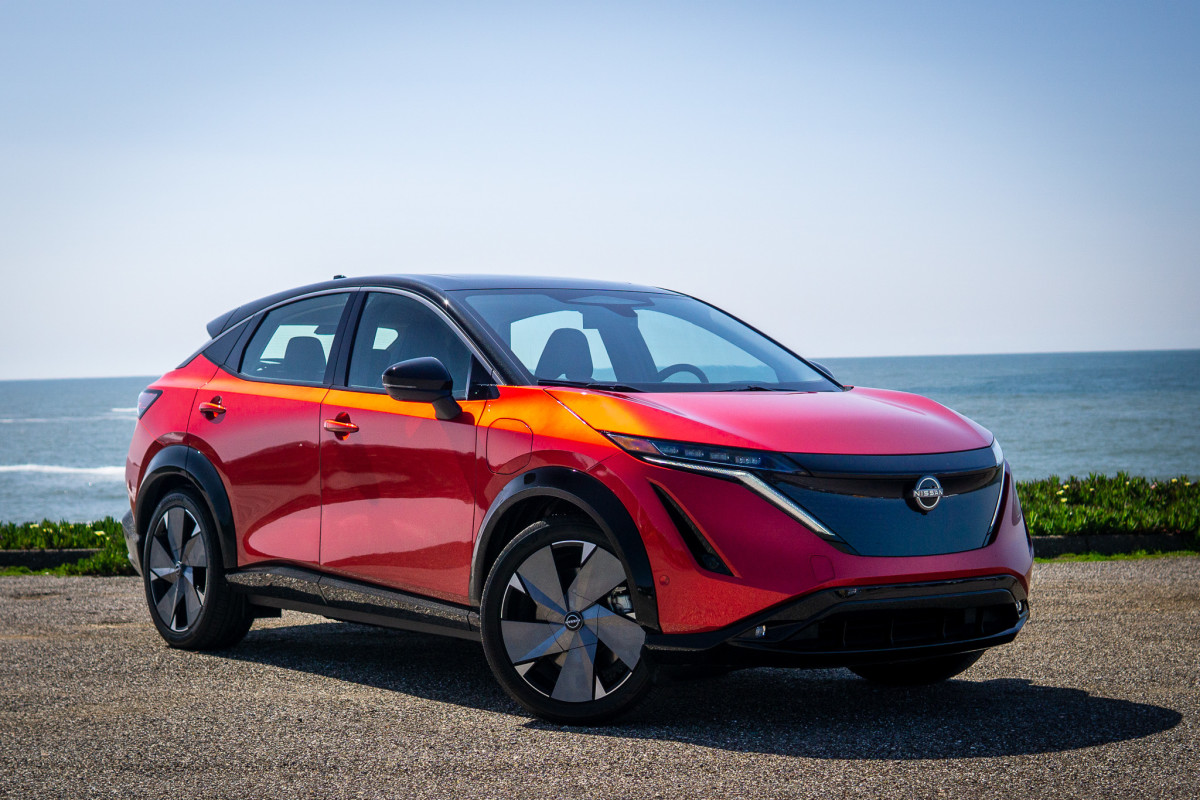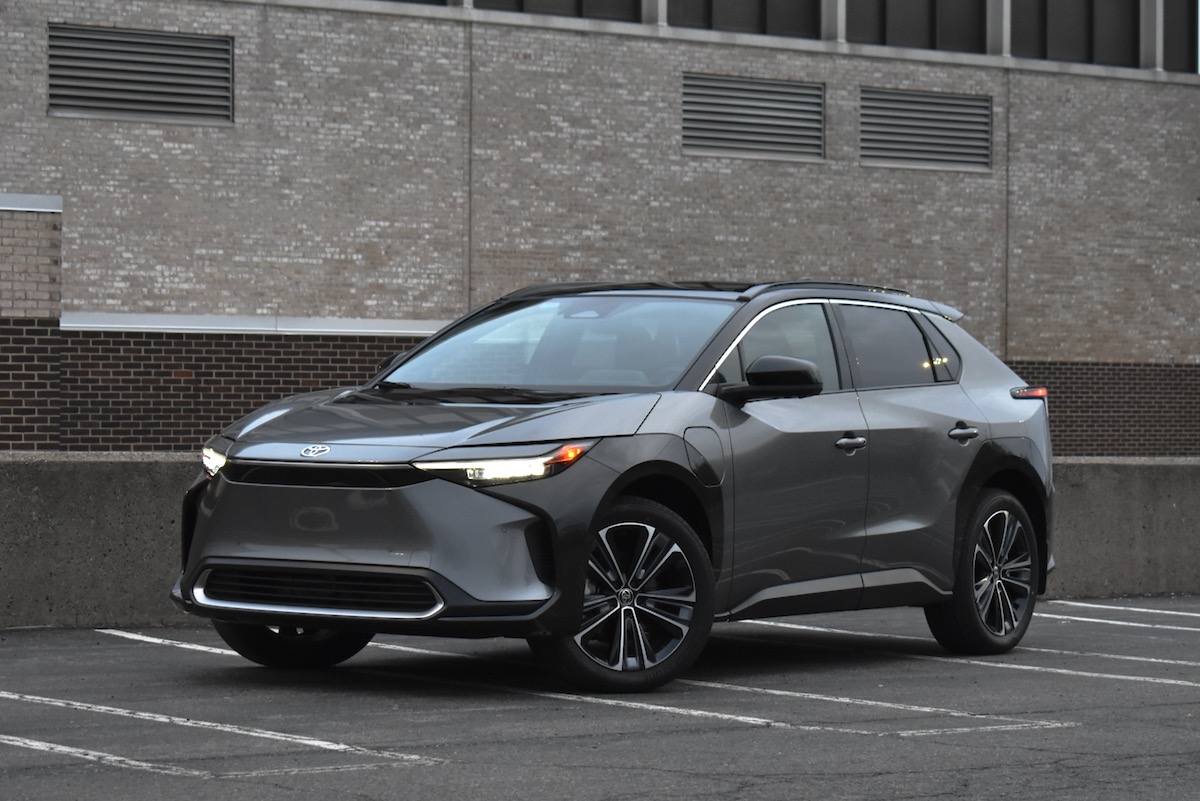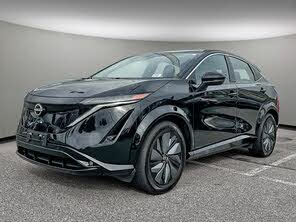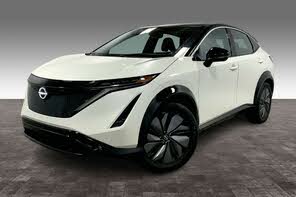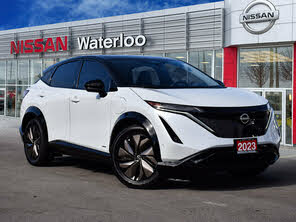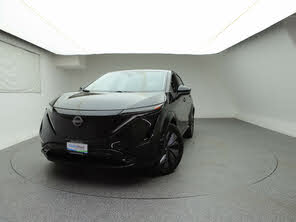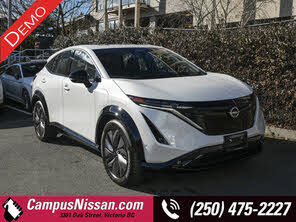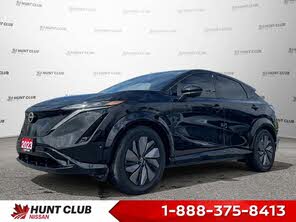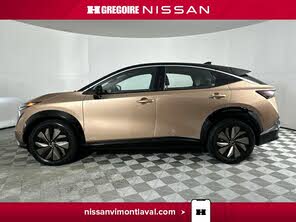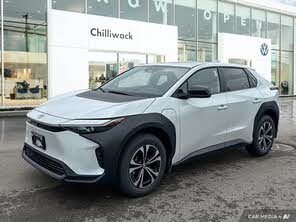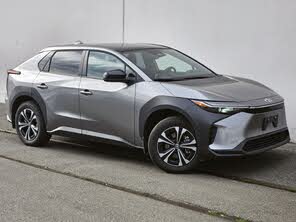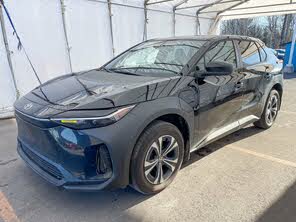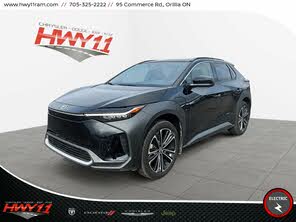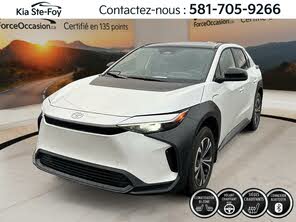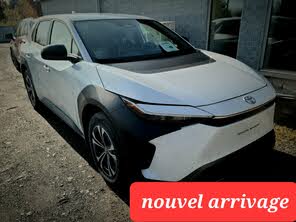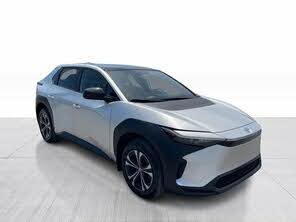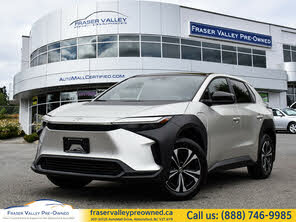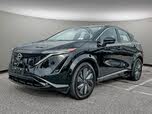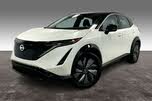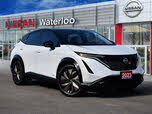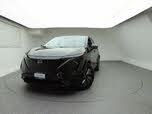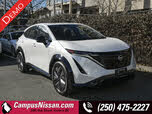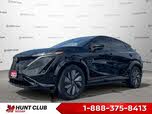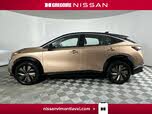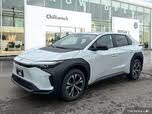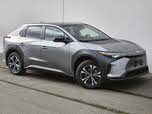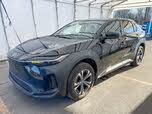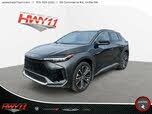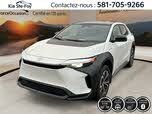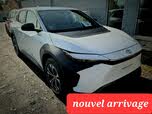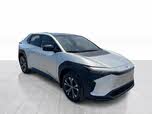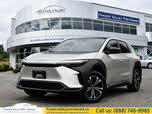Nissan Ariya vs Toyota bZ4X
Overview | |
Years produced2023-Present | Years produced2023-Present |
MSRP$43,190 | MSRP$42,000 |
Average price$50,868 | Average price |
Listings283 | Listings124 |
Ratings & Reviews | |
User Reviews | User Reviews |
Expert reviews8.5 out of 10 | Expert reviews6.3 out of 10 |
Pros
| Pros
|
Reviews SummaryBy 2023, it should be clear that electric vehicles (EVs) are here to stay. Companies that got started early on EVs have a head start, and when considering the current era of electric mobility, no major automaker got out of the starting blocks faster than Nissan. The 2010 Nissan Leaf invited the masses to experience quiet, efficient motoring—but in the decade-plus since its debut, it has been caught by more impressive competition. The all-new 2023 Nissan Ariya aims to retake market share in the electric vehicle space. With front- and all-wheel-drive powertrain options, slick design, immersive technology, and a competitive price tag, the Ariya looks capable of putting Nissan back into the EV conversation. We tested a single-motor Ariya in the fall of 2022 and have since evaluated the dual-motor e-4ORCE model for this updated review. | |
Reviews SummaryToyota is not known for battery-electric vehicles. Aside from the RAV4 EV models built to satisfy California regulations, Japan’s largest automaker’s quest to reduce emissions has mostly focused on hybrids like the Prius. So, the 2023 Toyota bZ4X is a major shift for the firm. The bZ4X is Toyota’s first electric car for the North American market aimed at volume sales—and it won’t be the last. The “bZ” prefix stands for “Beyond Zero,” the name Toyota is using for a family of planned electric models. For now, the bZ4X enters a crowded market of small electric crossover SUVs, already populated with a long list of entries like the Hyundai Ioniq 5, Ford Mustang Mach-E, Nissan Ariya, and Volkswagen ID.4, among others. When it comes to configurations, Toyota keeps things simple. In Canada, buyers can choose between L, LE, and XLE trim levels, and single-motor front-wheel drive (FWD) or dual-motor all-wheel drive (AWD) powertrains. This bZ4X review is based on our experience with the U.S. equivalent of an XLE AWD model with the Technology package. | |
No video found | No video found |
Popular Features & Specs | |
Engine214 hp Electric | Engine201 hp Electric |
Drive TrainFWD | Drive TrainFWD |
Seating Capacity5 | Seating Capacity5 |
EV Battery Capacity63 kWh | EV Battery Capacity71.4 kWh |
MPG City109 | MPG City127 |
MPG Highway94 | MPG Highway107 |
Battery Charge Time (240V)10.5 hours | Battery Charge Time (240V)9 hours |
Engine | |
Engine Name214 hp Electric | Engine Name201 hp Electric |
Battery Charge Time (240V)10.5 hours | Battery Charge Time (240V)9 hours |
DrivetrainFWD | DrivetrainFWD |
Fuel Economy | |
EV Battery Capacity63 kWh | EV Battery Capacity71.4 kWh |
MPG City109 | MPG City127 |
MPG Highway94 | MPG Highway107 |
Interior | |
Seating Capacity5 | Seating Capacity5 |
Key Features | |
Navigation SystemStandard | Navigation SystemStandard |
Sunroof/Moonroof | Sunroof/MoonroofStandard |
Safety | |
Front Crash Overall4 | Front Crash Overall5 |
Side Crash Overall5 | Side Crash Overall5 |
Dimensions & Capacity | |
Cargo Space22.8 cu ft | Cargo Space27.7 cu ft |
Curb Weight4323 lbs | Curb Weight4266 lbs |
Height65.4 in | Height65.0 in |
Length182.9 in | Length184.6 in |
Width85.5 in | Width73.2 in |
Wheelbase109.3 in | Wheelbase112.2 in |
Maximum Payload | Maximum Payload1169 lbs |
Number of doors4 | Number of doors4 |
Overview | ||
Years produced | 2023-Present | 2023-Present |
MSRP | $43,190 | $42,000 |
Average price | $50,868 | |
Listings | ||
Ratings & Reviews | ||
User reviews | 4.0 | 4.0 |
Expert reviews | 8.5 out of 10Read full review | 6.3 out of 10Read full review |
Pros & cons | Pros
| Pros
|
Summary | By 2023, it should be clear that electric vehicles (EVs) are here to stay. Companies that got started early on EVs have a head start, and when considering the current era of electric mobility, no major automaker got out of the starting blocks faster than Nissan. The 2010 Nissan Leaf invited the masses to experience quiet, efficient motoring—but in the decade-plus since its debut, it has been caught by more impressive competition. The all-new 2023 Nissan Ariya aims to retake market share in the electric vehicle space. With front- and all-wheel-drive powertrain options, slick design, immersive technology, and a competitive price tag, the Ariya looks capable of putting Nissan back into the EV conversation. We tested a single-motor Ariya in the fall of 2022 and have since evaluated the dual-motor e-4ORCE model for this updated review. | Toyota is not known for battery-electric vehicles. Aside from the RAV4 EV models built to satisfy California regulations, Japan’s largest automaker’s quest to reduce emissions has mostly focused on hybrids like the Prius. So, the 2023 Toyota bZ4X is a major shift for the firm. The bZ4X is Toyota’s first electric car for the North American market aimed at volume sales—and it won’t be the last. The “bZ” prefix stands for “Beyond Zero,” the name Toyota is using for a family of planned electric models. For now, the bZ4X enters a crowded market of small electric crossover SUVs, already populated with a long list of entries like the Hyundai Ioniq 5, Ford Mustang Mach-E, Nissan Ariya, and Volkswagen ID.4, among others. When it comes to configurations, Toyota keeps things simple. In Canada, buyers can choose between L, LE, and XLE trim levels, and single-motor front-wheel drive (FWD) or dual-motor all-wheel drive (AWD) powertrains. This bZ4X review is based on our experience with the U.S. equivalent of an XLE AWD model with the Technology package. |
Video | No video found | No video found |
Popular Features & Specs | ||
Engine | 214 hp Electric | 201 hp Electric |
Drive Train | FWD | FWD |
Seating Capacity | 5 | 5 |
EV Battery Capacity | 63 kWh | 71.4 kWh |
MPG City | 109 | 127 |
MPG Highway | 94 | 107 |
Battery Charge Time (240V) | 10.5 hours | 9 hours |
Engine | ||
Engine Name | 214 hp Electric | 201 hp Electric |
Battery Charge Time (240V) | 10.5 hours | 9 hours |
Drivetrain | FWD | FWD |
Fuel Economy | ||
EV Battery Capacity | 63 kWh | 71.4 kWh |
MPG City | 109 | 127 |
MPG Highway | 94 | 107 |
Interior | ||
Seating Capacity | 5 | 5 |
Key Features | ||
Navigation System | Standard | Standard |
Sunroof/Moonroof | Standard | |
Safety | ||
Front Crash Overall | 4 | 5 |
Side Crash Overall | 5 | 5 |
Dimensions & Capacity | ||
Cargo Space | 22.8 cu ft | 27.7 cu ft |
Curb Weight | 4323 lbs | 4266 lbs |
Height | 65.4 in | 65.0 in |
Length | 182.9 in | 184.6 in |
Width | 85.5 in | 73.2 in |
Wheelbase | 109.3 in | 112.2 in |
Maximum Payload | 1169 lbs | |
Number of doors | 4 | 4 |

By: CarGurus + AI
At CarGurus, our team of experienced automotive writers remain at the heart of our content operation, conducting hands-on car tests and writing insightful guides that are backed by years of industry experience. To complement this, we are harnessing AI to make our content offering more diverse and more helpful to shoppers than ever. To achieve this, our AI systems are based exclusively on CarGurus content, ratings and data, so that what we produce is both unique to CarGurus, and uniquely helpful to car shoppers.
